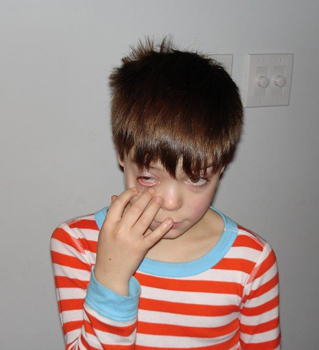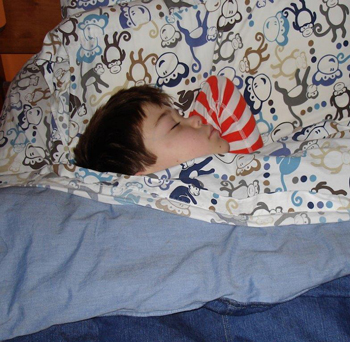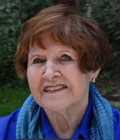Attitudes - When I was in high school, one teacher asked students to write down their hourly schedule and admonished students who slept eight or nine hours a night, saying that it was time wasted when they could be employed in a "constructive" pursuit. North Americans have idealized the doctor who works around the clock, the teacher, business person, politician, who juggles many duties with little sleep. A Harvard study of Fatigue Science "clearly shows this is foolish, and that significant fatigue is the equivalent of being drunk on alcohol."(1) A document prepared for Connecticut teachers reports: "Approximately 100,000 automobile crashes each year result from drivers who are "asleep at the wheel....sleepiness can cause difficulties with learning, memory, thinking, and feelings, which may lead to poor school and work performance and difficulty with relationships. Furthermore, problem sleepiness leads to errors and accidents in the workplace." (2) Because of lack of certain hormones during sleep, humans are subject to obesity, high blood pressure, sleep apnea and diabetes. (2a) Fatigue is currently recognized as a health issue.
Addressing the problem of fatigue - Patrick Byrne of Vancouver, Canada, observed that sports teams have terrible schedules. They often perform one night, fly to another city and perform the following day. In 2007, he founded Fatigue Science, a company that studies fatigue and offers solutions. Currently, sports teams, military institutions, mining companies and transportation agencies are using this service. Work schedules and travel management can be altered to better jive with a worker's circadian rhythms, people with sleep problems are identified and all users learn good sleep habits. (3) Participants wear Readibands, wrist devices which assess the quality and quantity of sleep and record a score. A score above 90 out of 100 means the person has a normal reaction time. But a score of 70 is equivalent to being drunk--that reaction time matches the reaction time of a rested person with a blood alcohol level of 0.08. (1) (4) In 2012, a Harvard study, published in Journal Surgery from the American Medical Association, used Readibands to investigate orthopedic surgical residents. "Typically the doctors slept 5.3 hours. At work, the study found residents were 'fatigued' half of the time, and 'impaired' one-quarter of the time. Because of this the 'risk of medical error' jumped 22 per cent." (1)
Is my child getting enough sleep? - Does your child yawn frequently, complain of feeling tired, want to nap, have low tolerance, have difficulty getting up in the morning, lack interest in things children usually enjoy? Is your child irritable and inattentive? If any of these conditions are observed, it is likely that your child needs more sleep. Although there are guide-lines about the amount of sleep required by children at different age levels, every child is an individual with unique requirements. Factors such as exercise, environment, health, diet and the amount of stress in the child's life all affect his/her sleep needs. (5)

Sleepy nine-year-old
The child who can't fall asleep - Elizabeth Pantley, author of parenting books and newsletters, asked children age 4-7 if they "lie awake in bed at bedtime." Most answered, "Yes." For children of all ages she recommends: 1. Be sure that they get physical exercise daily. 2. Arrange a quiet, dark, comfortable place for sleep with no electronic devices such as a computer, TV or cell phone. 3. Have a consistent bedtime. 4. Prevent hyper-stimulation just before bedtime such as watching violent TV programs, hearing violent stories and news. 5. Near bedtime, avoid foods such as high protein meat and fatty foods, chocolate, monosodium glutamate, citrus foods, carbonated beverages, sugar, white rice, white bread. Instead offer sleep-inducing foods (tryptophans): breast milk, cow's milk, soy milk, soy beans, eggs, bananas, avocados, turkey, tuna, almonds, cashew nuts, walnuts, cottage cheese, hard cheese, yogurt, peanut butter (unsweetened). (6) Young children need naps during the day or they become overly tired and can't relax at bedtime.
Parent involvement at bedtime - I believe that the anxiety which bothers children the most is their worry about security. When a child is about to relinquish control of his/her mind and body to sleep, having a parent or care-giver at the bedside to tuck him/her in is essential to overcome this fear. Some parents read or sing to their children. Gentle massage is recommended. (6) My niece goes to each of her daughters' bedsides to hear prayers. My son, Roy, was very hyper-active. When he was an infant I sang and rocked him to sleep. When he was two years old I formed the habit of patting his back or his hand and singing, "Mommie loves Roy and daddy loves Roy, and granny loves Roy," etc. If I stopped, he'd say, "Who else loves Roy?" He needed his cozy blanket and slept with it throughout his early teens. Other children form an attachment to a toy. Parents can teach their children to clear their minds: yoga can be a tool, or a hot bath. Imagining something soothing--a sandy beach with waves hitting the shore--using soft music to mask disruptive sounds or singing a repetitive song are all useful. (6)

Nine-year-old is finally fast asleep.
Childhood conditions that deprive the child of a restful sleep - You are not alone if your child has one of the following problems: bruxism (teeth grinding) - may be due to a deficiency, your dentist can advise; enuresis (bedwetting) - usually due to immaturity, but could be caused by stress or illness; sleepwalking, apnea, snoring, restless legs, narcolepsy (excess sleep) - require professional advice; nightmares - usually result from stress or frightening movies. Some of these conditions have a hereditary component, but can be controlled or corrected. Pediatric health care-givers are well versed to offer help. (6)
What happens while we sleep that makes sleep essential - Much is still unknown about the function of sleep but we know that it is essential, that if the individual gets less sleep than required, "sleep deprivation" results with consequences. Sleep debt mounts and must be addressed with additional sleep. Sleep is an active process. The major organs related to self-regulation of the body continue to function--for example, the heart, the respiratory system, and the brain, which emits electrical waves and the endocrine system which secretes hormones into the blood--hormones related to growth and repair, hormones related to reproduction and maturation to adulthood. Electrical waves from the brain's thalamus regulate many body rhythms. Brain waves signal the hypothalamus which seems to track how long we have been awake and calculate sleep debt. Waves go to the cerebral cortex, the region responsible for learning and thought. Sleep cycles involve repetition of five stages. These cycles last 90-100 minutes and repeat 4/6 times each night during which time the brain is very active. Sleep patterns are also regulated by our biological clock (circadian clock) located in the brain's hypothalamus, and operate on a 24-hour schedule. Humans function best during daylight and sleep best when it's dark. People working the night shift will become sleepy when daylight ends and may require bright light stimulation to function well. When we move from one time zone to another, our brain needs to be retrained. But our biological rhythms are also endogenous (self-sustaining--built in). Our biological clock is influenced by the seasons as well. The hypothalamus releases melatonin, a relaxant, during the absence of light. (2)
The relationship between age and sleep patterns - Sleep patterns change throughout life. Newborns sleep about 16-18 hours per day, five-year-olds sleep about 10-12 hours and adults sleep 7- 8 hours. The most significant change relates to the amount of sleep spent in the deepest stages of sleep, stages 3 and 4 of the cycle. For adolescents about 40 percent of deep sleep time is lost. Changes include a later secretion of melatonin signaling that it's time to sleep, and the signal to get up comes later in the morning. If students get less than 8.5 hours of sleep they become sleep deprived. (2) A study concluded that when adolescents were deprived of REM sleep (stage 5), they could not remember material that was learned just before sleeping; however, those who were not deprived of REM sleep could remember. (7) Currently there is movement for schools to begin the school day later. U.S. studies show when start times were changed from around 7:30 to 8:30, "tardiness and visits to the school nurse decreased, grades and moods improved and there was a decrease in car accidents among the student drivers." (8) During the last few years in Canada some high schools in British Columbia, Saskatchewan and Ontario, have introduced late start times. Studies by researchers from Carleton University concluded that later start times for the secondary grades show improvement regarding "sleep-debt, punctuality, attendance, behavior, sociability and continuous enrolment, particularly for the at-risk student population." (9) In 2009, Eastern Commerce Collegiate Institute in Toronto instituted a 10:00 a.m. to 4:00 p.m. day. Principal Jennifer Chan reports improved health among her students. "They are 2.5 times more likely than the students in the (control) school, to get nine hours sleep, which is the optimal time." The majority of students in the school like this schedule. Those who have reservations cite difficulty finding part-time work, scheduling sports and enrichment activities, problems at home when siblings are on different school schedules, and school boards cite a lack of money to bus students if start times vary within the district. (10)

Eastern Commerce Collegiate Institute, Toronto, Canada has a 10:00 a.m. to 4:00 p.m. day
References:
- (1) Ebner, David. 2014. "Want to win? Give it a rest. Sleep: People are starting to pay attention to the science of fatigue." The Globe and Mail, November 1, 2014. http://www.news-cloud.co.uk/TheGlobeAndMail/2014/11/01/GiveItARestSportsTeamsLearn...
- (2) "Sleep, Sleep Disorders and Biological Rhythms." Teacher's Guide. https://science.education.nih.gov/supplements/nih3/sleep/guide/info-sleep.htm
- (2a) "The Science "The science of sleep" 17 September, 2014. Science : Human Body & Mind. http://www.bbc.co.uk/science/humanbody/sleep/articles/whatissleep.shtml
- (3) "Fatigue Science 1000 Startups." http://www.1000startups.ca/startup/fatigue-science/
- (4) "EASILY MEASURE SLEEP, FATIGUE & ACCIDENT RISK" http://fatiguescience.com/solutions/readiband/
- (5) Weiss, Dr. Shelly K., MD, FRCPC, Mark Feldman, MD, FRCPC, James MacFarlane. BSc, PhD, Ian B. MacLusky, MB BS, FRCPC, et al. 2006. Better Sleep for Your Baby & Child. The Hospital for Sick Children, Robert Rose, Toronto, Canada.
- (6) Pantley, Elizabeth. 2005. The no-cry sleep solution for toddlers and preschoolers. McGraw-Hill.
- (7) "What Happens During Sleep? UPMC Life Changing Medicine http://www.upmc.com/Services/pulmonology/sleep-medicine/resources/Pages/during-sleep...
- (8) Cline, John, PhD. November 15, 2014. "Sleepless in America. Health rest, problem sleep, and the dreams and nightmares therein. Do Later School Start Times Really Help High School Students?" Psychology Today http://www.psychologytoday.com/blog/sleepless-in-america/201102/do-later-school-start...
- (9) "Schools let sleepy teens lie in. Teens benefit from later school starts, researchers and school boards find." Sep 03, 2012. CBC News. http://www.cbc.ca/news/health/schools-let-sleepy-teens-lie-in-1.1169804
- (10) Rushowy, Kristin, Education Reporter. "Toronto's late-start high school says absenteeism down, alertness up." Thu. May 09, 2013. Toronto Star. http://www.thestar.com/yourtoronto/educaiton/2013/05/09/torontos_latestart_high_school...



 Marlene Ritchie
Marlene Ritchie










